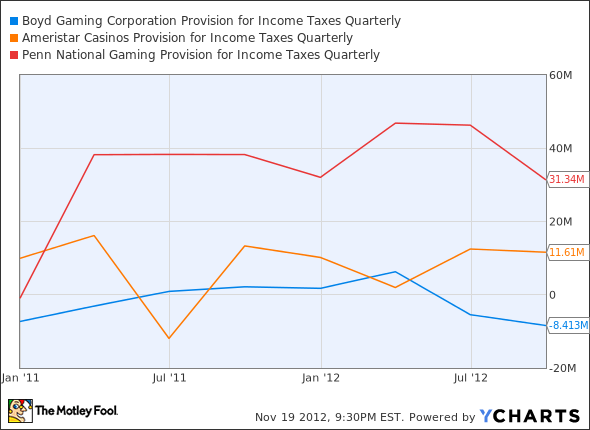Is the Gaming REIT a New Craze?
Penn National (NAS: PENN) introduced a new concept in gaming last week: the gaming REIT. Gaming companies have not normally split real estate and operating assets, but after years of paying high tax rates, Penn National's management has had enough and is looking for ways to unlock value.
This isn't a new concept in business. Hotels converted to REITs years ago as a way to pay lower tax rates, and companies are trying to stretch the status as far as they can. Since a huge portion of a casino's development cost is real estate, it makes a lot of sense for the industry. But is this the beginning of a trend?
How the deal works
Penn National will be splitting itself into an operating company, still Penn National (no change here), and a publicly traded REIT that will own the casino real estate.
Penn will then distribute shares in a tax-free dividend that will include shares of the REIT's stock worth about $10.05 per share and a $5.35 cash dividend. The REIT will then pay an estimated annual dividend of $2.36 per share from the initial rent of $450 million paid by Penn National.
Got all of that? In the end, the point is to push earnings to a REIT, which doesn't pay taxes and instead passes earnings on to shareholders in the form of a dividend, taxed at ordinary income-tax rates. This skirts paying corporate taxes and capital-gains taxes.
The benefit
Barclays estimates that the REIT structure would allow Penn to save $160 million in U.S. taxes, although it will push some of that down to shareholders.
Penn can push a large amount of the $2.83 billion in revenue it has generated over the past year to the REIT, transferring profits in the process. REIT owners get cash flow, while Penn National owners get a gaming operator that is more leveraged than it was in the past.
The trend begins...or not
The question is whether or not this becomes a trend for gaming companies. Ameristar Casinos' (NAS: ASCA) shares jumped 16% on Friday on speculation that it might try the same strategy. This could make some sense for regional U.S. operators like Ameristar or Boyd Gaming (NYS: BYD) . But the benefit would be reduced, because each company is paying less in taxes.
BYD Provision for Income Taxes Quarterly data by YCharts.
It also doesn't make a lot of sense for MGM Resorts (NYS: MGM) or Caesars Entertainment (NAS: CZR) , which are both losing money and getting a benefit from taxes. If they ever turn profitable, however, the story may change.
Operators with most of their operations overseas would not benefit either, because REITs are a U.S. tax structure and wouldn't affect tax rates overseas. So we won't likely see Las Vegas Sands (NYS: LVS) convert its properties into REITS.
The other big question is what it will do to the licensing of new casinos. Since these are separate companies, will it complicate matters for Penn or allow the REIT to own more casinos outside of Penn's network? We could speculate about the long-term implications, but they're really unknown at this point.
Foolish bottom line
What's good for one gaming company doesn't necessarily make sense for every gaming company. In this case, Penn National is one of the few U.S. gaming operators that have consistent profit and a reason to convert properties into REITs. For nearly every other company there would be little benefit. So it's a nice move for Penn and another reason I think this is the best regional gaming stock, but it won't become an industry trend.
What has been an industrywide craze is the trend toward gaming in Asia, where Las Vegas Sands has a dominant position. The company is now looking to spread its empire further, but will it be able to replicate its prior successes? Learn about all these opportunities, and the risks they pose, in our brand-new premium report on Las Vegas Sands. We're providing a full year of analyst updates to go with it, so be sure to claim your copy today by clicking here.
The article Is the Gaming REIT a New Craze? originally appeared on Fool.com.
Fool contributor Travis Hoium has no positions in the stocks mentioned above. You can follow Travis on Twitter at @FlushDrawFool, check out his personal stock holdings or follow his CAPS picks at TMFFlushDraw. The Motley Fool has no positions in the stocks mentioned above. Try any of our Foolish newsletter services free for 30 days. We Fools may not all hold the same opinions, but we all believe that considering a diverse range of insights makes us better investors. The Motley Fool has a disclosure policy.
Copyright © 1995 - 2012 The Motley Fool, LLC. All rights reserved. The Motley Fool has a disclosure policy.


